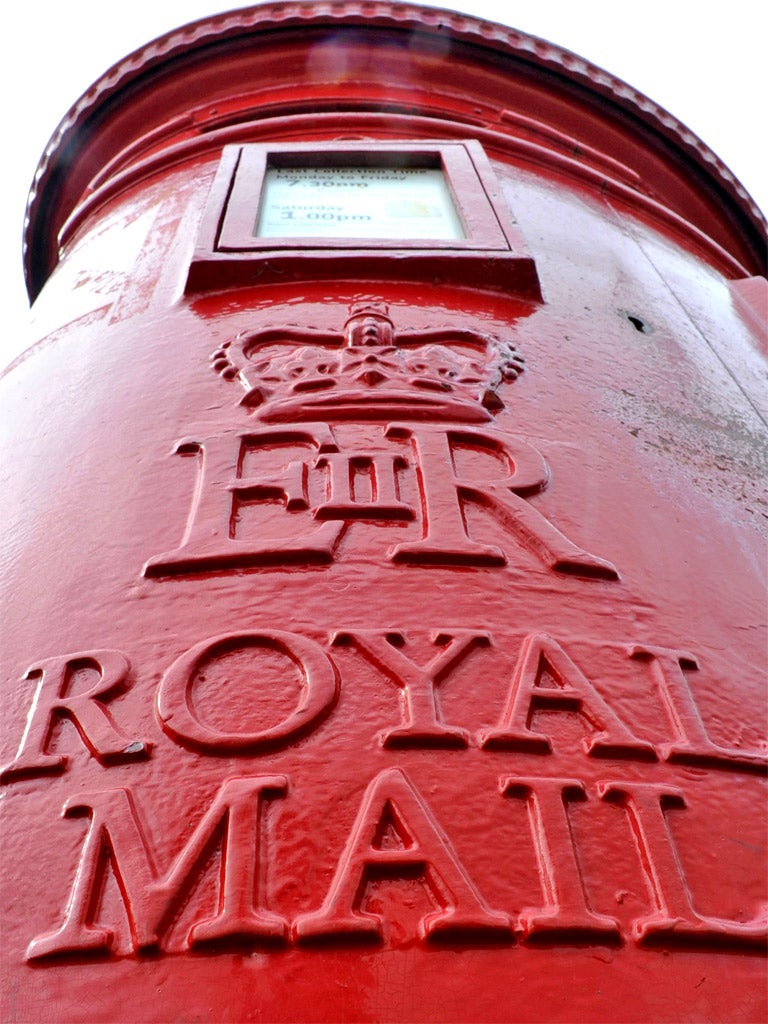Royal Mail: A £4bn sell-off waiting to be delivered
Better figures bring the biggest privatisation since the railways a step closer

It's been lost in the post for a while, but Royal Mail's £4bn privatisation project finally looks like an imminent delivery. Yesterday the group dispatched first-class half-year results to the Government's doorstep: hitting Britons with stamp price hikes of up to 40 per cent helped Royal Mail to post a 12 per cent jump in half-year, pre-tax profit to £115m. That was despite an ongoing decline in the number of letters in the average postman's daily sack, which fell 9 per cent to 6.8 billion in the six months to 23 September. The service instead cashed in on its May increase in stamp prices, when the cost of a first-class stamp rose from 46p to 60p. And the company which delivers Amazon's goods continued to benefit from surging online shopping: revenues at its parcel businesses grew 4.6 per cent to £2bn.
But a major reason for the transformation in Royal Mail's finances has been that the Government took over its giant pension fund, which saw £28bn of assets and £38bn in liabilities transferred to the state, and meant there was no equivalent to 2010-11's £292m deficit payment. The taxpayer got a raw deal on that transaction: a short-term boost to the country's national accounts will trigger heavy liabilities in the future.
Now other elements of Britain's most high-profile privatisation since John Major sold off the railway don't look too appealing for consumers either.
Staff – and the postal unions – are vehemently set against it: privatisation would be likely to bring more job cuts on top of the 42,000 that Royal Mail has axed since 2002. Meanwhile, users can expect to face higher prices, and less service. The beginning of the end of Monday-Saturday daily deliveries could even be imminent, according to the industry expert James Greenbury, who ran the City mail service DX – which was born out of Royal Mail strikes – and is currently chief executive of the parcels business Parcel2Go.com.
"Post-privatisation, Royal Mail will still have its high fixed cost base but it will be carrying ever-lower letter volumes," Mr Greenbury says. "Already, it has pushed up all prices – not just the visible ones that the public can see, such as stamps, but also "final mile" fees that it charges to parcel operators, which was around 14p each and is now nearer 20p. Next April I expect there will be another significant price increase in stamps to underwrite the profit necessary for flotation."
Although second-class stamps are restricted to inflation-level rises, under Ofcom's regulation, others are not. "But eventually the volume decline will be such that even that won't be enough, and in 10 years' time I'd be very surprised if we were still getting post every day, Monday to Saturday."
Currently, thanks to the reiterations made in the Postal Services Act 2011, Royal Mail is the universal service provider, and Saturday is defined as a working day, so Royal Mail is required to deliver letters on six days a week. "But that can change," Mr Greenbury maintains. In the US, the nearly bankrupt Postal Service has spent months of this year urging Congress to pass legislation that would allow it to eliminate Saturday mail delivery.
Mr Greenbury adds: "When BT was privatised, there was great sensitivity about telephone boxes being protected, now no one cares. It will be the same with the post – the rate of digitalisation means that in 10 or 20 years' time, people will be fine with receiving post only two or three times a week."
Moya Greene, the chief executive, who received a £1.1m pay packet last year, making her one of Britain's best-paid public-sector officials, said: "Parcels are an increasing segment of our traffic and customers want those six days a week. I see my job to build a business that makes universal service six days a week sustainable."
Meanwhile, the Government has said it will not give a timetable for its target of starting to sell or float at least part of Royal Mail, but ministers have signed up UBS bankers to run their side of the deal, while Royal Mail has hired Barclays to look after its own back.
The hoped-for method of privatisation is a flotation – much more palatable, the Government thinks, than a sale, which could struggle if no buyers emerge, or hit major controversy if an asset-stripper such as private equity came up with the best bid. So ministers and the Shareholder Executive, which manages state-owned assets, plan a roadshow of City institutions to begin after Christmas.
To potential investors, the numbers appear to be going in the right direction to achieve that aim. Royal Mail's "universal service" letter division – where postmen deliver to 29 million homes a week – remained in the black after returning to profit in the last full year. A loss of £41m in the six months to September 2011 was converted into a £99m profit.
Subscribe to Independent Premium to bookmark this article
Want to bookmark your favourite articles and stories to read or reference later? Start your Independent Premium subscription today.

Join our commenting forum
Join thought-provoking conversations, follow other Independent readers and see their replies